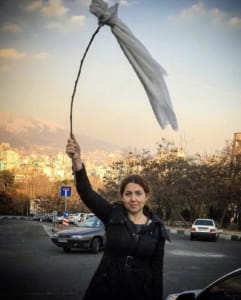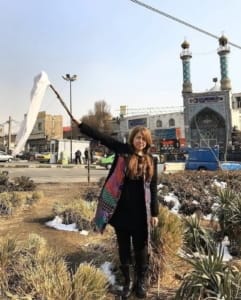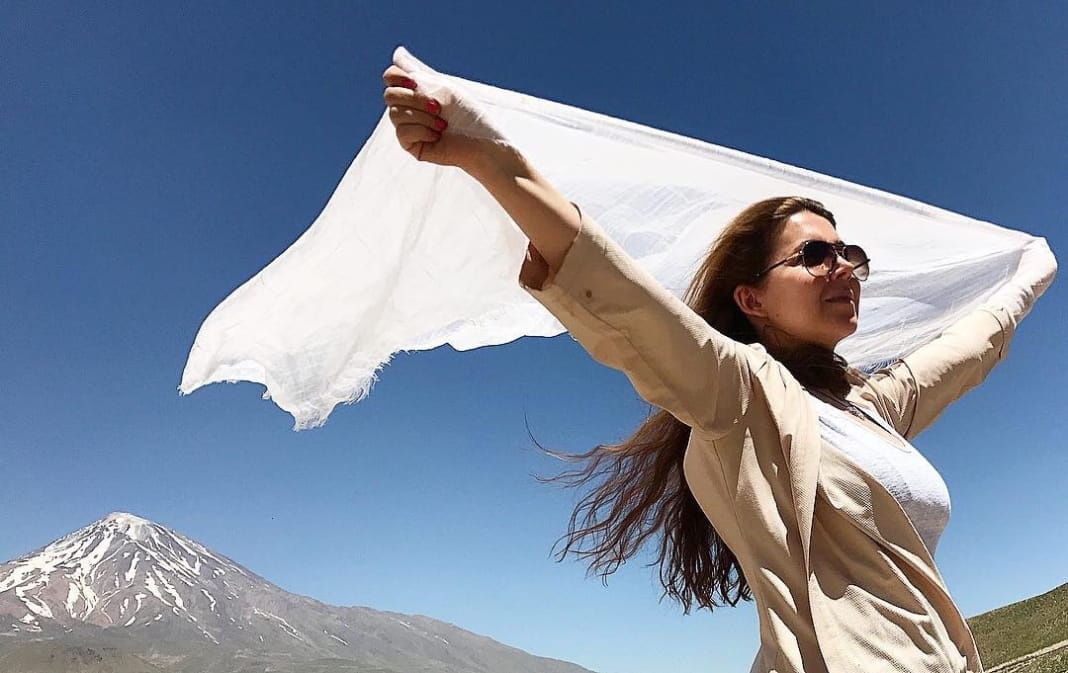Shaparak Shajarizadeh (1975) is a women’s rights activist from Iran. She was arrested three times for her protests against the compulsory hijab as part of the White Wednesdays campaign. Shaparak fled to Canada in 2018, where she continues her activism. She was named one of the BBC 100 Women 2018 and in February she was awarded the 2020 International Women’s Award at the Geneva Summit for Human Rights and Democracy. In the meantime, Iran sentenced her to 2 years in prison and 18 years probation. Shaparak told us about her activism and how the rest of the world can support the Iranian people’s struggle for freedom.
‘I can’t tell you exactly when I started to feel that something wasn’t right. When I was growing up, there were a lot of changes in my country. But people weren’t paying attention, because they were involved with the Iran-Iraq war – sometimes, cities were being bombed. Many new laws were introduced during those years, putting more pressure on people, especially on women.
‘When I was six years old and had to go to school, my mum told me that I had to wear a headscarf. At that time, it was a colourful, normal scarf. We were allowed to put on a pantyhose, but in the second year this changed and we had to wear pants. Many kids were wearing jeans, but in the third year that also changed – we called jeans ‘Levi’s’, an American brand, so we weren’t supposed to wear those anymore. From that year on, we were supposed to wear a uniform. The fourth year, they came up with a different kind of scarf, that looked like a piece of fabric with a hole in it: a ‘maqnae’.
‘If you wanted to attend a prestigious school, you were supposed to wear the ‘better’ type of hijab, the chador: a very large, black piece of cloth that you wear over your dress. I was one of the best students in my school, but I told my parents that I couldn’t go to a prestigious school: it’s so hard to wear that kind of clothing, but I also didn’t want to look like that, head to toe in black.’
Nightmares about marriage
‘When I was growing up, I also heard more and more stories about women who were losing their children after a divorce. Or women who were married to an abusive or addictive husband and wanted to get out of that marriage but couldn’t, because they had no right to a divorce. So I had nightmares about marrying a bad guy and not being able to divorce him. But even if I would marry a good guy, I was very scared of getting married. My biggest nightmare – even until a few years ago – was that my husband would die and his father would have custody over my children, not me. In Islam, if a man dies and his father is still alive, he is allowed custody of the children and not the mother. This happened a lot around me.
‘I married my high school sweetheart. Although I was in love, he was so abusive that I couldn’t stay in that marriage. I went through a lot during the trial. The judges were very rude and insulted me, just because I was asking for a divorce. This happens to many Iranian women. When my sister wanted to get a divorce, the judge was so rude and impolite that even her ex-husband got mad and told him: “Stop it! We cannot live together, but it doesn’t mean that she’s a bad woman. You have no right to talk to her like that.”’
Iranians are not that religious. There are many atheists in Iran
Fed up
‘I grew up with all these humiliations and insults, but I didn’t know what to do. I was fed up with living a lie and tolerating violence every day. When we are out in the streets, police officers or fanatical followers of the regime can harass women because of the way they dress. Most of us don’t believe in the hijab, but it is compulsory to wear it.
‘Iranians are not that religious. There are many atheists in Iran. There are also many people who have converted to other religions, or who follow spiritual beliefs from the East. But you can get killed if you say that you don’t believe in Islam, so we keep it to ourselves – among friends, we know which ones are atheists or practice other religions. But even lots of Muslim women don’t believe in wearing the hijab.
‘In Iran, people always talk about politics. Women always talk about not having any rights. But it was just nagging, we weren’t brave enough to do something. I was fed up with nagging. But many of my friends didn’t want to take any risks.’
Support
‘I was an engineer. I wasn’t involved in activism or in touch with women’s rights activists, but I was following all the news about them. In Iran there are two kinds of activists: the real ones and women who claim to be activists, but are affiliated with the authorities, mostly relatives of government officials. They claim that they are working for women’s rights, but at the same time they support discriminatory laws – in the worst case they defend polygamy for men and the compulsory hijab.
‘The real activists would end up in jail or flee the country and continue their activism outside Iran. I knew nothing would really change if we didn’t support them. For years I was reading about the suffragette movement in the West and how they gained their rights. At first, it was just middle-class and upper middle-class women. I realized that the suffragettes only became powerful enough to change laws when they asked ordinary, working-class women to join them.’
White Wednesdays

‘When Masih Alinejad started the White Wednesdays movement, I realized that this was the moment I could do something. Masih lives in the USA and launched a campaign, asking Iranian women and men who demand equality and are against the compulsory hijab to come forward every Wednesday, not wearing headscarves or wearing something white, and film themselves or take pictures and send them to her. Masih used her social media to talk about the compulsory hijab and inequality between men and women in Iran. From that moment on, all Iranian women had a platform.
‘In the second week of the campaign, I filmed myself on the streets without the hijab while wearing something white. I sent this to Masih. That was the start of my activism. During the campaign, I found other women who were thinking like me. After a few months, the world noticed our movement. Reporters started to contact me for interviews.
‘It was the first move to gain our rights one by one, starting with the compulsory hijab: the obvious symbol of sexual discrimination in Iran.’
Western female politicians should tell Iranian officials that they won’t obey
Ignorance
‘The same day I was arrested for protesting peacefully, a Dutch minister came to Iran and she obeyed wearing the compulsory hijab. When she was asked why she did it, she said that there were “more important issues” and that Iran didn’t have “our human rights culture”. I would like to have the opportunity to talk to her in person and ask her face-to-face: “Would you be happy if somebody told you that human rights aren’t part of your culture? That the hijab isn’t an important issue, but if you don’t wear it they’ll put you in prison?”
‘Also, the compulsory hijab is not part of Persian culture. They force women to wear the hijab because of Islam. And even if it was Persian culture, it’s not right to force people to dress like their ancestors did centuries ago. Are you wearing the traditional Dutch clothes right now? Would you like to be forced to wear it? No? That’s also the case for Iranians. So I thought this woman’s answers were childish.
‘A lot of politicians just want to be ignorant. Some of them claim that they value human rights, but when it comes to political matters, they bury those rights. Did the Dutch minister have any influence on human rights issues in Iran? I don’t think so. Do you think obeying man’s laws helps women to gain their rights? No, you cannot obey something and at the same time gain your rights. If you claim you’re supporting women’s rights, you must stand for them. Western female politicians should tell Iranian officials that they won’t obey. Because right now, at the same time they’re visiting Iran, there are women locked up in prison because they protest this discriminatory law. You have no idea how horrible the situation is inside those prisons.
‘If I was a female politician from the West, I would come to Iran and surprise the officials at the airport. If the government would send a politician back to her country, it would be a big controversy everywhere. Just imagine the impact it would have all over the world, if you would see on the news that a Western female politician was forced to go back to her country, because she refused to wear the compulsory hijab?’
Political Islam
 ‘It’s because of this government’s ideology. They want to have an Islamic country and spread this kind of government around the world. This is different from Islam: it’s political Islam. And it’s dangerous. The world is witnessing that. They are a danger to the region: the Islamic regime is supporting terrorist groups like Hezbollah and Hamas, making everything worse.
‘It’s because of this government’s ideology. They want to have an Islamic country and spread this kind of government around the world. This is different from Islam: it’s political Islam. And it’s dangerous. The world is witnessing that. They are a danger to the region: the Islamic regime is supporting terrorist groups like Hezbollah and Hamas, making everything worse.
‘This is not Islamophobic, but reality. As a woman who has grown up in a Muslim country, who has listened to their beliefs and claims, I know what’s really going on in their minds. From the start of the revolution they have claimed that they want to spread political Islam around the world. They want to have it in Jerusalem, they want to have it in Washington D.C.. People from the Revolutionary Guard are saying this all the time. They pray for that day to come.
‘Do not deal with governments or groups who share this kind of ideology, like the Iranian regime, the Taliban in Afghanistan or ISIS. Right now, there are reports of the US making deals with the Taliban. Have they forgotten everything that’s happened during the Taliban regime? They were literally killing women in the streets. Women’s rights activists are in great danger in Afghanistan, even right now. The government allows their actions, but the Taliban still has the power to assassinate them.
‘Ideologues are the most dangerous people in the world, because they would do anything to be in power. Last November, the Iranian government killed more than a thousand people in the streets in three days. They were just aiming at people’s heads and shooting at them. And they would do this again. The Iranian people are rising up, they can’t stand poverty and not having freedom anymore. But the Revolutionary Guard would kill every Iranian who would challenge them.
‘The same happened in Europe centuries ago, during the rule of the Church. People were suppressed and killed because they did not believe in Christianity. Scientists were killed. But in Europe this is history. In Iran, we are living through this right now.’
Lies
‘For the past forty years, the Iranian government has been growing bolder and bolder. They’re bullying the world. Other countries should realize that they’re dealing with a bully. They’re doing whatever they want. They’re lying to the world about human rights violations in Iran, about the protesters they’ve killed. Just like they’re lying to their own people.
‘The main reason that the corona virus spread in Iran is the government. About two and a half months ago, the first case was recognized in Qom city, the religious centre of Iran. They kept it from the public eye because they wanted people to join in a pro-regime demonstration to celebrate the revolution. After that, there were reports of many, many people being infected. Again, the government lied to people and they didn’t do anything. They lied because they wanted people to take part in the election. Only after the election, they announced that the corona virus had really broken out. By then, there were more than a hundred cases in that city and still they didn’t impose quarantine measures. Since then it has spread to other cities, but still they are lying about the statistics. They have no idea how to control it.’
In Canada the human rights defenders gave me a platform… At the same time my friend is in prison
Freedom
‘Last year, International Women’s Day was the first day in my life that I could go to a woman’s rally in Toronto. I was in tears all day. In Iran, women don’t have this right. Every year, for forty years, the government suppressed every gathering, even private gatherings, and arrested all the women in the streets. Last year, three women went out on this day, giving flowers to women on the subway, even to religious women, asking them to be united, to support our cause. Now these three women are in jail. One of them is my close friend.
‘Just take a look at this one day to see the violation of women’s rights in Iran. Just this day. Last year my friend went on the trains to give women flowers and talk about women’s rights. I was here in Toronto, enjoying all the freedoms. In Canada the human rights defenders gave me a platform, they’re listening to me, they gave me an award and they’re praising me. At the same time my friend is in prison. I was shouting in the streets – she wasn’t shouting, she was just handing out flowers. Do you see the difference?
‘And now we’re afraid of her life because of the corona virus…
‘… I’m so sorry, I always get emotional when I talk about my friends in jail.
‘The corona virus is spreading inside prisons. They’re releasing prisoners temporarily now, but my friend is still inside. My lawyer Nasrin Sotoudeh is also in prison. Because of the outbreak of the corona virus, she’s on hunger strike, demanding the release of political prisoners.’
Left-wing?
‘It’s sad that the Iranian people have to rely on the right-wing parties in the West. Most of the left-wing parties right now are supporting the Iranian government. That’s one of the mysteries of the world: left-wing parties were supposed to be against religious politics. Even in Canada, our left-wing party opposes sanctions against Iran. Canada broke off diplomatic relations with Iran years ago, but this party wants to open the embassy and start having diplomatic relations again.
‘They claim that they want equality for all, but they are supporting this corrupt dictatorial regime. The Iranian government is the opposite of equality for all.’
The Iranian people know that they have to pay a price for freedom
Pressure
 ‘In democratic countries, people have the power to change how politicians act. As activists, we try to draw attention to violations of human rights and the dangers posed by the Iranian government, so people are aware of this reality and put pressure on their governments to do something. That’s the good thing about democratic countries. Now that I’m living in one, this is my aim.
‘In democratic countries, people have the power to change how politicians act. As activists, we try to draw attention to violations of human rights and the dangers posed by the Iranian government, so people are aware of this reality and put pressure on their governments to do something. That’s the good thing about democratic countries. Now that I’m living in one, this is my aim.
‘During my speech at the Geneva Summit, I told the human rights defenders and politicians: If you support the Iranian people, instead of negotiating and dealing with the Islamic regime, and help them change the government, you’re going to do a favour to a nation and to peace in that region. If after forty years the world would stand in solidarity with the Iranian people and put pressure on Iran, that would be it. Many drastic things are happening each month: in November mass killing of protesters, after that it was the killing of Qassem Soleimani, after that it was the shooting of the Ukrainian plane, the corona virus. It’s getting worse for the government, but also for the people.
‘If the world would put more pressure on the government, maybe something would happen. I’m not saying that the situation is the same, but the world did a good job with the Apartheids-regime in South-Africa years ago. Maybe the same could be done to the Iranian government. The Iranian people know that they have to pay a price for freedom. When you see people chanting in the streets, they don’t blame sanctions, they blame the government. The terrorist adventures in the region, that’s not what the Iranian people want. The Iranian people want to have a good life, they want freedom, a better economic situation, they want to have their government accountable for what it’s doing.
‘The Iranian people are suffering. Things can’t go on like this.’







